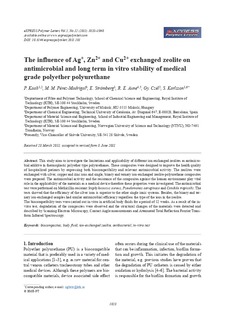| dc.contributor.author | Kaali, P | |
| dc.contributor.author | Perez-Madrigal, MM | |
| dc.contributor.author | Stromberg, E | |
| dc.contributor.author | Aune, Ragnhild Elizabeth | |
| dc.contributor.author | Czel, G | |
| dc.contributor.author | Karlsson, S | |
| dc.date.accessioned | 2019-10-11T11:51:16Z | |
| dc.date.available | 2019-10-11T11:51:16Z | |
| dc.date.created | 2011-12-14T12:29:47Z | |
| dc.date.issued | 2011 | |
| dc.identifier.citation | eXPRESS Polymer Letters. 2011, 5 (12), 1028-1040. | nb_NO |
| dc.identifier.issn | 1788-618X | |
| dc.identifier.uri | http://hdl.handle.net/11250/2621623 | |
| dc.description.abstract | This study aims to investigate the limitations and applicability of different ion exchanged zeolites as antimicrobial additive in thermoplastic polyether type polyurethanes. These composites were designed to improve the health quality of hospitalized patients by expressing both biocompatibility and relevant antimicrobial activity. The zeolites were exchanged with silver, copper and zinc ions and single, binary and ternary ion-exchanged zeolite-polyurethane composites were prepared. The antimicrobial activity and the resistance of the composites against the human environment play vital role in the applicability of the materials as a medical device therefore these properties were investigated. The antimicrobial test were performed on Methicillin-resistant Staphylococcus aureus, Pseudomonas aeruginosa and Candida Tropicalis. The tests showed that the efficiency of the silver ions is superior to the other single ionic systems. Besides, the binary and ternary ion-exchanged samples had similar antimicrobial efficiency regardless the type of the ions in the zeolite. The biocompatibility tests were carried out in-vitro in artificial body fluids for a period of 12 weeks. As a result of the invitro test, degradation of the composites were observed and the structural changes of the materials were detected and described by Scanning Electron Microscopy, Contact Angle measurements and Attenuated Total Reflection Fourier Transform Infrared Spectroscopy | nb_NO |
| dc.language.iso | eng | nb_NO |
| dc.title | The influence of Ag+, Zn2+ and Cu2+ exchanged zeolite on antimicrobial and long term in vitro stability of medical grade polyether polyurethane | nb_NO |
| dc.type | Journal article | nb_NO |
| dc.type | Peer reviewed | nb_NO |
| dc.description.version | publishedVersion | nb_NO |
| dc.source.pagenumber | 1028-1040 | nb_NO |
| dc.source.volume | 5 | nb_NO |
| dc.source.journal | eXPRESS Polymer Letters | nb_NO |
| dc.source.issue | 12 | nb_NO |
| dc.identifier.doi | 10.3144/expresspolymlett.2011.101 | |
| dc.identifier.cristin | 867856 | |
| dc.description.localcode | eXPRESS Polymer Letters is an open access journal, both downloading the published articles and publication is free of charge (neither submission charges, nor article processing charges are charged). The users have the right to read, print, search, download, copy, distribute or link to the full texts of these articles, given that they credit the original source, without any alterations or commercial use. | nb_NO |
| cristin.unitcode | 194,66,35,0 | |
| cristin.unitname | Institutt for materialteknologi | |
| cristin.ispublished | true | |
| cristin.fulltext | original | |
| cristin.qualitycode | 1 | |
